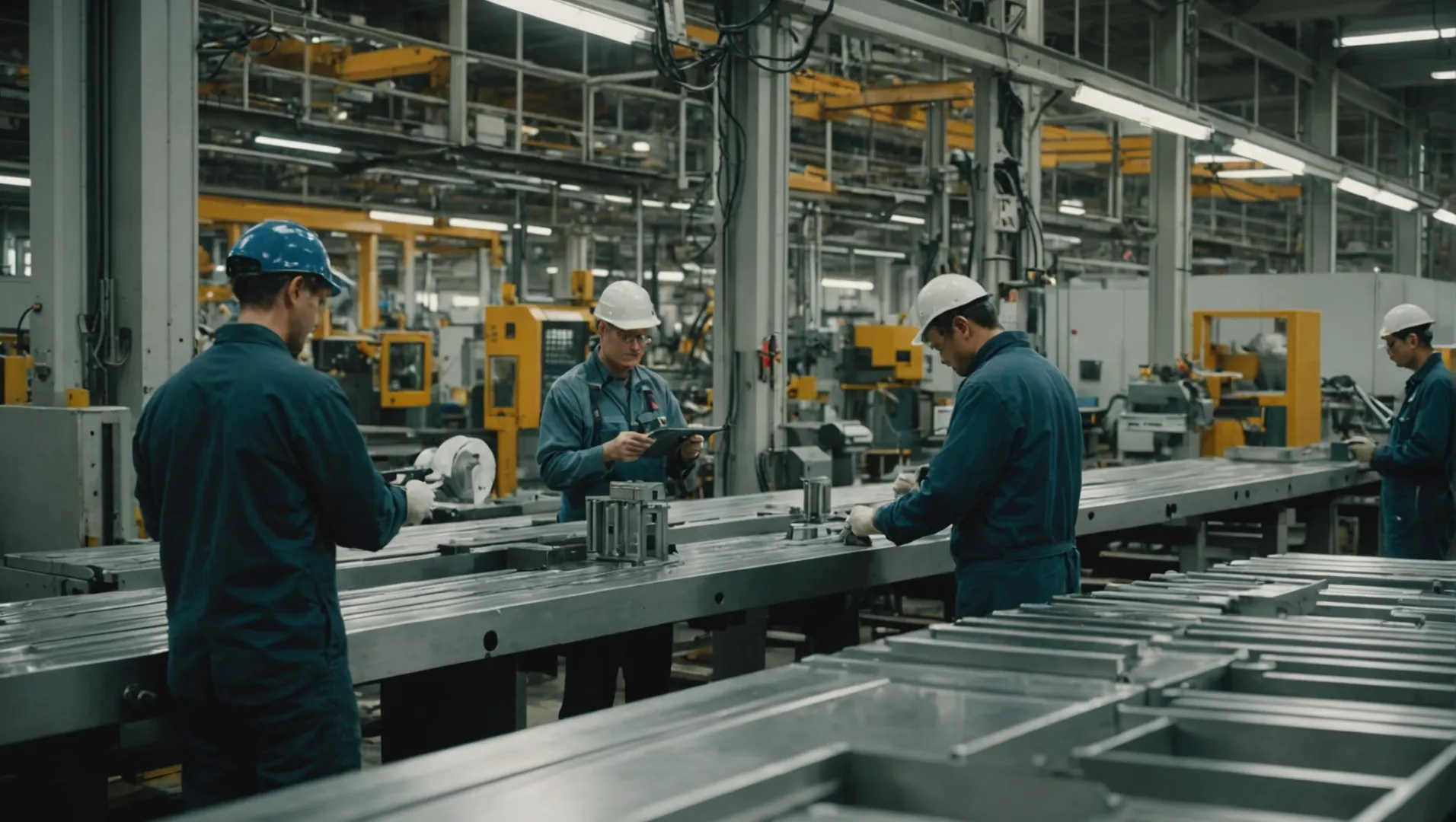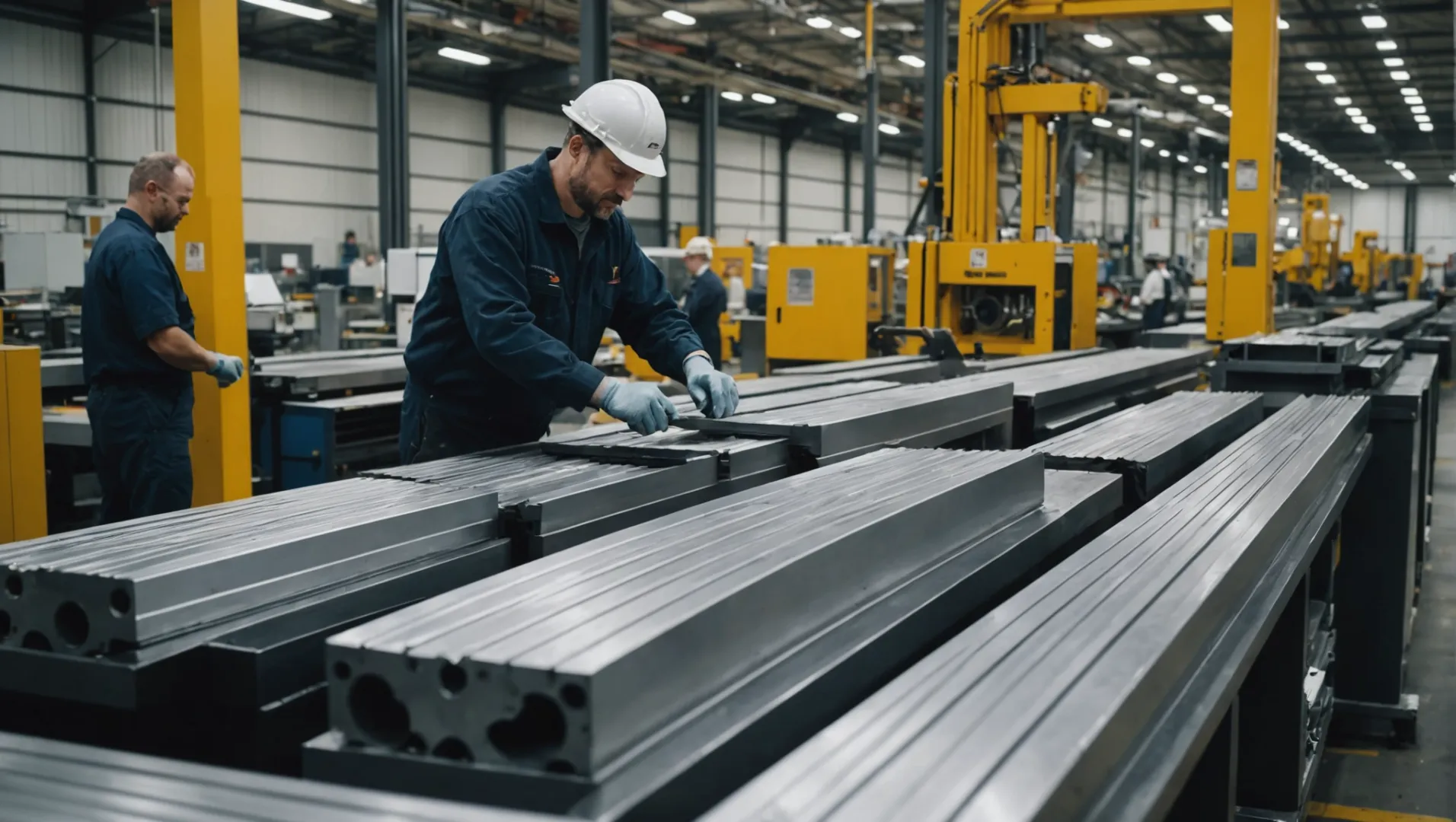How Can You Navigate Custom Aluminum Extrusion Production and Lead Times?
Navigating the complex world of custom aluminum extrusion can feel overwhelming. But, with the right insights, you can take control of the process.
To effectively manage custom aluminum extrusion production and lead times, you must understand the stages from design confirmation to shipment. Key factors such as mold production, sample approval, and mass production play significant roles in determining timelines.
While this overview provides a snapshot of the process, delving deeper into each stage can reveal strategies to optimize production timelines and enhance efficiency. Let’s explore how to master these elements and meet your project needs effectively.
Mold production time varies with mold size and complexity.True
Larger, more complex molds take longer to produce due to intricate details.
What Are the Key Stages in Custom Aluminum Extrusion Production?
Understanding each stage in custom aluminum extrusion is crucial for timely project delivery.
Custom aluminum extrusion production involves design confirmation, mold production, sample approval, and mass production. Each stage is vital for ensuring quality and meeting lead times. Understanding these phases helps in optimizing processes and managing expectations effectively.

Design Confirmation
The initial stage of the custom aluminum extrusion process is design confirmation. Here, collaboration between the design team and the client ensures all specifications are accurate. This is pivotal as it sets the foundation for the subsequent stages. Errors at this stage can lead to costly revisions later.
Mold Production
Mold production is arguably the most critical and time-consuming phase. The duration varies based on the size and complexity of the mold:
| Diagonal Dimension | Production Time |
|---|---|
| < 150mm | 7-8 days |
| 150-200mm | 10 days |
| 200-250mm | 12 days |
| 250-350mm | 15-17 days |
Complex designs, such as those required for high-density heat sinks or precision parts, demand more time due to intricate detail requirements.
Sample Production and Approval
Once the mold is completed, a nitriding process is carried out to enhance durability. Initial samples are then produced for client approval. This stage involves a feedback loop where samples are refined until they meet the desired standards. Typically, this process should not exceed a month, but high-precision demands might extend this timeline.
Mass Production and Shipping
With client approval secured, mass production commences. A typical production timeline for a 20-foot container is detailed below:
- Billet Extrusion: 8-10 days
- Surface Treatments: 7-8 days (includes anodizing and painting)
- Quality Inspection & Packaging: 2-3 days
Overall, the production cycle spans approximately 20-25 days. For urgent orders, expedited services can reduce this timeline significantly.
Understanding these stages can provide valuable insights into optimizing custom aluminum extrusion1 timelines and meeting project deadlines efficiently.
Mold production takes 7-17 days based on size.True
Mold production time varies with mold size, from 7 to 17 days.
Sample approval typically takes over a month.False
Sample approval usually takes under a month unless precision is required.
How Does Design Complexity Affect Production Timelines?
Design complexity plays a pivotal role in determining the duration of production timelines, impacting each phase of manufacturing.
Complex designs in aluminum extrusion require longer production times due to intricate mold creation, extended sample approval processes, and additional surface treatment steps. By understanding these factors, manufacturers can better plan and manage timelines effectively.

The Intricacies of Mold Production
Design complexity directly influences the time taken for mold production2. Complex designs often necessitate molds with intricate features, which can extend the production timeline significantly. For example, molds for high-density heat sinks or precision parts with tight tolerances may take longer than standard molds due to the need for precise specifications and additional machining steps.
| Mold Type | Diagonal Dimension | Production Time (days) |
|---|---|---|
| Simple | < 150mm | 7-8 |
| Moderate | 150-200mm | 10 |
| Complex | 200-250mm | 12 |
| Very Complex | 250-350mm | 15-17 |
Sample Production and Approval Challenges
Once the mold is ready, the sample production phase begins, which can be particularly challenging for complex designs. Producing a satisfactory sample often involves multiple iterations and adjustments, especially when the product has precise requirements. This stage could extend up to a month for high-precision products.
The need for nitriding3 and subsequent testing adds further time to this phase. Understanding these steps can help anticipate potential delays and better plan project timelines.
Mass Production Considerations
The complexity of design can also affect mass production. For instance, intricate profiles might require additional surface treatments like anodizing or painting, which further extend the timeline. Each step in the surface treatment process is crucial to achieving the desired finish, contributing to the overall timeline.
Managing Design Complexity
To manage design complexity effectively, consider consulting with experts early in the design phase to identify potential challenges and streamline production. Engaging in collaborative design reviews can mitigate unforeseen issues and optimize timelines.
By understanding and anticipating the effects of design complexity, manufacturers can better manage expectations and ensure timely delivery of products, even when dealing with intricate designs.
Complex designs extend aluminum extrusion production timelines.True
Intricate molds and additional treatments lengthen production phases.
Simple molds for aluminum extrusion take 15-17 days to produce.False
Simple molds take 7-8 days; very complex molds need 15-17 days.
What Are Best Practices for Approving Sample Production?
Ensuring the quality of your product starts with the sample production phase. Approving samples effectively can streamline your entire production process.
Best practices for approving sample production include thorough inspections, clear communication, and iterative testing to ensure product quality meets specifications before full-scale manufacturing.

Thorough Inspections
During the sample approval stage, conducting a thorough inspection of the initial samples is crucial. Check for any discrepancies in dimensions, surface finish, and structural integrity against your design specifications. Utilize both visual inspections and precision measuring tools to ensure accuracy. Involving a quality control team early on can prevent costly errors later in the process.
Clear Communication
Effective communication between your production team and the client is essential. Regular updates and feedback loops help address any issues swiftly. Establish a protocol for logging all changes and approvals to maintain transparency and track progress. Using project management tools can facilitate better communication and document sharing.
Iterative Testing
Incorporate iterative testing into the approval process. By producing multiple sample iterations, you can refine and perfect the design. Testing under real-world conditions can reveal potential flaws that aren’t apparent during initial inspections. This approach allows for adjustments in design or materials, leading to a more robust final product.
Flexibility in Adjustments
Be prepared to make adjustments as needed. Whether it involves tweaking the mold design or altering material choices, flexibility can be crucial in meeting client expectations. Having a contingency plan ensures that the process doesn’t stall due to unforeseen challenges.
Utilizing Feedback
Gathering detailed feedback from clients on sample performance can offer insights into potential improvements. Encourage clients to provide comprehensive feedback that covers all aspects of the sample’s performance in its intended environment. Use this information to make informed decisions about any necessary adjustments before moving to mass production.
By implementing these best practices, you can enhance the efficiency and effectiveness of your sample production approval process, setting a solid foundation for successful mass production. Learn more about sample approval best practices4 or explore strategies to optimize production timelines5.
Thorough inspections ensure sample production quality.True
Inspections check for discrepancies, ensuring samples meet design specs.
Iterative testing is unnecessary in sample approval.False
Iterative testing refines designs, revealing flaws not seen initially.
How Can You Expedite Custom Aluminum Extrusion Orders?
In a fast-paced manufacturing world, meeting deadlines is crucial. Learn how to speed up your aluminum extrusion orders effectively.
To expedite custom aluminum extrusion orders, streamline the design process, use existing molds, and opt for expedited services when available. Effective communication and precise specifications can significantly reduce lead times.

Streamlining the Design Process
Begin by ensuring that your design phase is efficient. Collaborate closely with the design team to finalize product designs quickly. Providing clear, precise specifications reduces back-and-forth communication and speeds up the confirmation process.
Utilizing Existing Molds
If the product design allows, reuse existing molds to eliminate the time needed for mold production. This is particularly useful for repeat orders or similar designs. Check with your manufacturer about available mold options that might fit your needs.
| Mold Size | Standard Production Time | Expedited Production Time |
|---|---|---|
| <150mm | 7-8 days | 3-5 days |
| 150-200mm | 10 days | 5-7 days |
| 200-250mm | 12 days | 6-8 days |
| 250-350mm | 15-17 days | 8-10 days |
Opting for Expedited Services
Many manufacturers offer expedited services for urgent orders. Communicate your deadlines early and inquire about special provisions to accelerate production and shipping processes.
Enhancing Communication Channels
Maintain open lines of communication with your supplier. Regular updates and clear dialogue can prevent misunderstandings that cause delays. Using digital platforms for real-time updates can also enhance collaboration.
For further insights on managing production timelines, you might want to explore managing production delays6 to understand common pitfalls and solutions. Additionally, learn about communication strategies in manufacturing7 to improve collaboration with your suppliers.
Using existing molds speeds up extrusion orders.True
Reusing molds eliminates time needed for new mold production.
Expedited services guarantee same-day aluminum extrusion delivery.False
Expedited services reduce lead times but do not guarantee same-day delivery.
Conclusion
Understanding the nuances of custom aluminum extrusion is key to successful project execution. By optimizing each stage, you can streamline processes and meet tight deadlines.
-
Learn detailed insights into optimizing production timelines.: Material Preheating – The billet gets cut to the correct length. · Extrusion – Once the billet heats up, it gets coated with a lubricant. ↩
-
Explore detailed insights into mold complexity’s impact on timelines.: Frequency of Use: Molds used in continuous, high-volume production runs may degrade faster due to the constant stress and thermal cycling. ↩
-
Learn about nitriding’s role in refining production samples.: This process takes place by contacting the steel at high temperature (but below 538°C) with ammonia or other nitrogen compounds. Decomposition of ammonia yields … ↩
-
Provides in-depth strategies for effective sample approval processes.: The PPAP process consists of 18 elements that may be required for approval of production level parts. Not all of the elements are required for every submission. ↩
-
Offers insights on enhancing efficiency and managing timelines effectively.: Eliminate non-value-added activities, reduce inventory, and optimize process flows to improve overall efficiency. ↩
-
Discover strategies to prevent and handle common production delays.: 1. Identify the causes 2. Communicate effectively 3. Implement solutions 4. Prevent future delays 5. Review your performance ↩
-
Learn effective communication tactics to enhance supplier relationships.: Provide training · Create common areas · Organize events · Meet regularly · Use shop floor reporting · Create a communication infrastructure · Email … ↩




